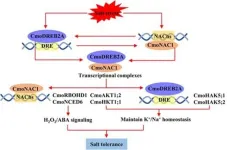(Press-News.org) SAN ANTONIO, June 21, 2024 – Research led by in part by The University of Texas Health Science Center at San Antonio (UT Health San Antonio) finds that the most common cerebral small-vessel disease feature seen in brain magnetic resonance imaging is a primary vascular factor associated with dementia risk.
Results of the major international study emphasize the significance of that feature, known as white matter hyperintensity (WMH) burden, in preventive strategies for dementia.
“Our findings provide converging evidence that WMH is a major vascular factor associated with dementia risk,” said Muralidharan Sargurupremraj, PhD, an assistant professor at the Glenn Biggs Institute for Alzheimer’s and Neurodegenerative Diseases at UT Health San Antonio. “They also support WMH as a surrogate marker for clinical trials to prevent dementia by controlling vascular risk.”
Sargurupremraj is the first and co-corresponding author of the research, titled, “Genetic Complexities of Cerebral Small Vessel Disease, Blood Pressure, and Dementia,” published May 22 in JAMA Network Open, a monthly open-access medical journal published by the American Medical Association.
The study notes that with increasing life expectancy, the prevalence of dementia is expected to reach 75 million people globally by 2030, which makes devising strategies to prevent or delay its occurrence a major public health priority. The scientific community widely recognizes that most dementia cases, including Alzheimer’s disease, are related to a combination of vascular and neurodegenerative lesions.
And cerebral small-vessel disease is thought to be the main underlying contribution to cognitive decline and dementia, with nearly half of dementia cases showing both Alzheimer’s and cerebral small-vessel disease neuropathologic characteristics, the study notes.
Still, while observational studies had shown evidence of an association between white matter hyperintensity burden and increased risk of stroke and dementia, causal evidence had been limited. White matter hyperintensities are lesions in the brain that show up as areas of increased brightness in T2-weighted magnetic resonance imaging.
In the new study, researchers were able to provide evidence of a causal link between vascular traits and Alzheimer’s disease, using genetic instrument variable analyses known as Mendelian randomization – a method that leverages the natural randomization of genetic alleles to test how differences in the genetic effect on modifiable exposure influence disease risk.
Specifically, in a two-year analysis ending July 24, 2022, and using Alzheimer’s disease genome-wide association studies of up to 75,000 European dementia cases, they found causal evidence of an association of larger WMH burden with increased risk of the disease, accounting for pulse-pressure effects.
The study also highlighted the importance of combining several complementary epidemiological approaches and data types, and of accounting for caveats of instrumental variable analyses when exploring the impact of vascular traits on late-onset diseases like dementia.
“As vascular disease is a treatable contributor to dementia risk, our findings have broad significance for prevention strategies of Alzheimer’s and dementia as a whole,” Sargurupremraj concluded.
The researchers advise future studies to examine whether their findings can be generalized to non-European populations.
Other institutions and entities represented in the study include the University of Bordeaux (France); University of Washington; University of Michigan; University of Tartu (Estonia); Erasmus MC University Medical Center, Rotterdam (Netherlands); Boston University and the National Heart, Lung, and Blood Institute Framingham Heart Study; Icelandic Heart Association (Iceland); Washington University, St. Louis; University of Oxford (United Kingdom); Department of Public Health, Bordeaux (France); University of Pittsburgh; University of Lille (France); Radboud University, Nijmegen (Netherlands); Universidad Adolfo Ibáñez, Santiago (Chile); University of Iceland (Iceland); Oslo University Hospital, Oslo (Norway); Norwegian University of Science and Technology; Imperial College London (United Kingdom); National Institute on Aging; and Bordeaux University Hospital (France).
UT Health San Antonio is a primary driver of San Antonio’s leading $44.1 billion health care and biosciences sector, and is the largest academic research institution in South Texas with an annual research portfolio of $413 million.
Genetic Complexities of Cerebral Small Vessel Disease, Blood Pressure, and Dementia
Muralidharan Sargurupremraj, Aicha Soumaré, Joshua C. Bis, Ida Surakka, Tuuli Jürgenson, Pierre Joly, Maria J. Knol, Ruiqi Wang, Qiong Yang, Claudia L. Satizabal, Alexander Gudjonsson, Aniket Mishra, Vincent Bouteloup, Chia-Ling Phuah, Cornelia M. van Duijn, Carlos Cruchaga, Carole Dufouil, Geneviève Chêne, Oscar L. Lopez, Bruce M. Psaty, Christophe Tzourio, Philippe Amouyel, Hieab H. Adams, Hélène Jacqmin-Gadda, Mohammad Arfan Ikram, Vilmundur Gudnason, Lili Milani, Bendik S. Winsvold, Kristian Hveem, Paul M. Matthews, W.T. Longstreth, Sudha Seshadri, Lenore J. Launer, Stéphanie Debette
First published: May 22, 2024, JAMA Network Open
Link to full study article:
Genetic Complexities of Cerebral Small Vessel Disease, Blood Pressure, and Dementia | Genetics and Genomics | JAMA Network Open | JAMA Network
The University of Texas Health Science Center at San Antonio (UT Health San Antonio) is one of the country’s leading health science universities and is designated as a Hispanic-Serving Institution by the U.S. Department of Education. With missions of teaching, research, patient care and community engagement, its schools of medicine, nursing, dentistry, health professions, graduate biomedical sciences and public health have graduated more than 43,886 alumni who are leading change, advancing their fields and renewing hope for patients and their families throughout South Texas and the world. To learn about the many ways “We make lives better®,” visit UTHealthSA.org.
Stay connected with The University of Texas Health Science Center at San Antonio on Facebook, Twitter, LinkedIn, Instagram and YouTube.
The Glenn Biggs Institute for Alzheimer's and Neurodegenerative Diseases is dedicated to providing comprehensive dementia care while advancing treatment through clinical trials and research. The Biggs Institute is a National Institute on Aging (NIA)-designated Alzheimer’s Disease Research Center (ADRC). In addition to patient care and research, the Biggs Institute partners with the School of Nursing at UT Health Science Center San Antonio to offer the Caring for the Caregiver program.
END
Research finds causal evidence tying cerebral small-vessel disease to Alzheimer’s, dementia
Study led partly by UT Health San Antonio suggests new prevention strategies
2024-06-21
ELSE PRESS RELEASES FROM THIS DATE:
Navigating the Pyrocene: Recent Cell Press papers on managing fire risk
2024-06-21
As wildfires become more intense and the fire season grows longer across parts of the world, humans will need to adapt. In this collection of papers from Cell Press journals One Earth and Cell Reports Sustainability, an intersection of fire management researchers comment on what needs to change to ensure we can collaborate across stakeholders in a more fire-resistant future.
The papers are publishing in advance of a Cell Press 50th Anniversary sustainabiltiy forum on the topic of “Navigating the Pyrocene: Managing fire risk in a warming world.” The virtual event, free to register, takes place Thursday, July 11, 2024 at 11:00 am ET.
This ...
Restoring the Great Salt Lake would have environmental justice as well as ecological benefits
2024-06-21
Inland seas around the world are drying up due to increasing human water use and accelerating climate change, and their desiccation is releasing harmful dust that pollutes the surrounding areas during acute dust storms. Using the Great Salt Lake in Utah as a case study, researchers show that dust exposure was highest among Pacific Islanders and Hispanic people and lower in white people compared to all other racial/ethnic groups, and higher for individuals without a high school diploma. Restoring the lake ...
Cannabis, tobacco use, and COVID-19 outcomes
2024-06-21
About The Study: The findings of this cohort study suggest that cannabis use may be an independent risk factor for COVID-19–related complications, even after considering cigarette smoking, vaccination status, comorbidities, and other risk factors.
Corresponding Author: To contact the corresponding author, Li-Shiun Chen, M.D., M.P.H., Sc.D., email li-shiun@wustl.edu.
To access the embargoed study: Visit our For The Media website at this link https://media.jamanetwork.com/
(doi:10.1001/jamanetworkopen.2024.17977)
Editor’s ...
A 5:2 intermittent fasting meal replacement diet and glycemic control for adults with diabetes
2024-06-21
About The Study: This randomized clinical trial of Chinese adults with overweight or obesity and with early type 2 diabetes found that an intermittent fasting plan consisting of two nonconsecutive fasting days and five days of habitual intake per week and meal replacement diet (5:2 MR) could improve glycemic outcomes and weight loss in the short term compared with metformin or empagliflozin, making it a promising initial intervention and early management for type 2 diabetes.
Corresponding Author: To contact the corresponding author, Lixin Guo, M.D., email glx1218@163.com.
To access the embargoed study: Visit ...
Scientists document self-propelling oxygen decline in the oceans
2024-06-21
Scientists from the University of Copenhagen have made significant strides in understanding ancient ocean anoxia, with potential insights for today's marine environments.
500 million years ago the so-called Cambrian ‘SPICE’ event made oxygen levels in the oceans drop dramatically.
Now, researchers from the University of Copenhagen have investigated how large-scale ocean anoxia, or oxygen-depleted conditions, developed during the event, and its potential consequences today.
In the study, titled "Cascading oxygen loss shorewards in the oceans – insights from the Cambrian SPICE event" published in OneEarth ...
Activating molecular target reverses multiple hallmarks of aging
2024-06-21
HOUSTON ― Researchers at The University of Texas MD Anderson Cancer Center have demonstrated that therapeutically restoring ‘youthful’ levels of a specific subunit of the telomerase enzyme can significantly reduce the signs and symptoms of aging in preclinical models. If these findings are confirmed in clinical studies, there may be therapeutic implications for age-related diseases such as Alzheimer’s, Parkinson’s, heart disease and cancer.
The study, published today in Cell, identified a small molecule compound ...
Cannabis use tied to increased risk of severe COVID-19
2024-06-21
As the deadly disease that came to be known as COVID-19 started spreading in late 2019, scientists rushed to answer a critical question: Who is most at risk?
They quickly recognized that a handful of characteristics — including age, smoking history, high body mass index (BMI) and the presence of other diseases such as diabetes — made people infected with the virus much more likely to become seriously ill and even die. But one suggested risk factor remains unconfirmed more than four years later: cannabis use. Evidence has emerged over time indicating both ...
How to make ageing a ‘fairer game’ for all wormkind
2024-06-21
Why do some people live for longer than others? The genes in our DNA sequence are important, helping avoid disease or maintain general health, but differences in our genome sequence alone explain less than 30% of the natural variance of human life expectancy.
Exploring how ageing is influenced at the molecular level could shed light on lifespan variation, but generating data at the speed, scale and quality necessary to study this in humans is unfeasible. Instead, researchers turn to worms (Caenorhabditis elegans). Humans share a lot of biology with these small creatures, who also have a large, natural variation in lifespan.
Researchers ...
Supporting the right small changes can have big impacts
2024-06-21
Small changes in our everyday actions can trigger significant, rapid societal shifts especially when it comes to climate action. A new IIASA-led study highlights the importance of analyzing these dynamics with a comprehensive framework to harness their full potential for reducing carbon emissions.
Making small changes in how we live day-to-day can quickly create significant changes in society, especially in ways that benefit the environment. This idea is captured in the term social tipping points.
According to the authors of a new paper just published in the journal One Earth, social tipping points are crucial for speeding up efforts to reduce carbon emissions. These points occur when ...
Grafted cucumbers get a boost: pumpkin's secret to withstanding salinity
2024-06-21
A pivotal study has discovered a genetic synergy between pumpkin and cucumber that fortifies the latter's resilience against salinity. The research illuminates the role of the CmoDREB2A transcription factor from pumpkin, which, when interacted with cucumber's CmoNAC1, forms a regulatory loop that enhances salt tolerance. This breakthrough could be key to developing crops that thrive in saline soils, safeguarding agricultural productivity.
Soil salinity, a silent blight on global agriculture, affects an estimated 10% of the world's arable land, leading to significant crop ...
LAST 30 PRESS RELEASES:
Reconstructing the world’s ant diversity in 3D
UMD entomologist helps bring the world’s ant diversity to life in 3D imagery
ESA’s Mars orbiters watch solar superstorm hit the Red Planet
The secret lives of catalysts: How microscopic networks power reactions
Molecular ‘catapult’ fires electrons at the limits of physics
Researcher finds evidence supporting sucrose can help manage painful procedures in infants
New study identifies key factors supporting indigenous well-being
Bureaucracy Index 2026: Business sector hit hardest
ECMWF’s portable global forecasting model OpenIFS now available for all
Yale study challenges notion that aging means decline, finds many older adults improve over time
Korean researchers enable early detection of brain disorders with a single drop of saliva!
Swipe right, but safer
Duke-NUS scientists identify more effective way to detect poultry viruses in live markets
Low-intensity treadmill exercise preconditioning mitigates post-stroke injury in mouse models
How moss helped solve a grave-robbing mystery
How much sleep do teens get? Six-seven hours.
Patients regain weight rapidly after stopping weight loss drugs – but still keep off a quarter of weight lost
GLP-1 diabetes drugs linked to reduced risk of addiction and substance-related death
Councils face industry legal threats for campaigns warning against wood burning stoves
GLP-1 medications get at the heart of addiction: study
Global trauma study highlights shared learning as interest in whole blood resurges
Almost a third of Gen Z men agree a wife should obey her husband
Trapping light on thermal photodetectors shatters speed records
New review highlights the future of tubular solid oxide fuel cells for clean energy systems
Pig farm ammonia pollution may indirectly accelerate climate warming, new study finds
Modified biochar helps compost retain nitrogen and build richer soil organic matter
First gene regulation clinical trials for epilepsy show promising results
Life-changing drug identified for children with rare epilepsy
Husker researchers collaborate to explore fear of spiders
Mayo Clinic researchers discover hidden brain map that may improve epilepsy care
[Press-News.org] Research finds causal evidence tying cerebral small-vessel disease to Alzheimer’s, dementiaStudy led partly by UT Health San Antonio suggests new prevention strategies




